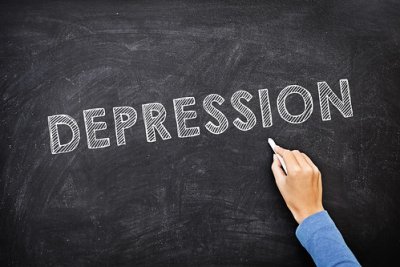Dating Someone With Depression – 12 Things You Need to Know

By: Kevin Dooley
by Andrea M. Darcy
Dating someone with depression can be a lot to navigate. What can help?
[**if you believe your partner is in immediate danger of hurting themselves or someone else please get to the nearest hospital or call emergency services.]
Dating someone with depression is a choice
First things first. Remember that you chose this relationship.
And you are with this other person for many reasons. People who suffer depression are also the same people who can understand your emotions, or who are wildly creative, exciting, fun, and inspiring.
Feeling a victim about this? Then there is a good chance this is your pattern, too. That if you are honest, you often (if not always) choose a partner with depression and issues because you are issues, too, such as codependency.
So what now?
1. Accept that your partner is depressed.
Pretending the other person is okay, or telling them they will ‘snap out of it’, just means the other person feels guilty. And guilt is like wood to a fire when it comes to depression. It means your partner will feel worse, not better.
Like it or not, your partner is depressed, and there is no telling when it will end. Depression follows nobody’s time line. (Although on a good note, it always does end, eventually).
2. Do your research.
With the amount of information now out there about depression, there is no excuse for not understanding it.

By: Mike Cohen
Read our free ‘Guide to Depression” as a start. Or visit the NHS pages about clinical depression.
And consider reading case studies of depression, not just the facts and science.
3. But don’t then analyse your partner.
Information and research is to help you be more empathetic, not to help you play shrink.
When someone is depressed, their mind is already analysing them non stop, deeming them not worthy, sick, hopeless, or even ‘evil’ and ‘bad for others’. The last thing they need is you to give them any other diagnostic to add to the list, even if well intentioned.
4. Instead, listen.
Good listening means being fully present and focused, not assuming you know what they mean but asking, not thinking about other things or what you’ll stay next. It means reflecting back and asking good questions.
[Learn more in our article, ‘How to Listen Like a Therapist’.]
5. Remember that they are not their depression.
No matter how depressed your partner gets, or what sensational things they say, they are still that person you know and love.
If it helps, see depression as a sort of virus. Would you blame someone with the flu for moaning about feeling terrible?
6. But do have boundaries.
This is not to say you should let a partner treat you badly, depression or no. Some people can regress with depression, acting like an angry child, and might even be relieved you are setting some firm boundaries around what they can and can’t say to you or can and can’t do.
It can help to write the boundaries down when dating someone with depression. This could mean sending an email, so there is no room for pretending limits weren’t set. Start the mail with positives and be calm and kind. “You are an important person I care about, I know you are going through a rough patch, but….”.
Another important boundary here is to maintain your own life. You are not a nurse, you can’t be there for someone else 24 seven. Like the airplane mask situation, where you must put on your own mask first, you need to take care of yourself when supporting someone with depression.
7. Practise good self-care together.
Love a good bottle of wine? That’s fine. But alcohol and party drugs are bodily depressants, which then cause mood spirals. As can things like inconsistent sleeping habits and unhealthy food.
When you are around a partner with depression it’s best to encourage healthy living and self-care until they feel better. Keep the wine binge for a night out with your friends.
8. Talk to the person you know, not the depression.
If you respond to all the things your partner says due to depression, you will rush headlong into relationship conflict.
How to know the difference? Depression-talk is made up of cognitive distortions, which is what it sounds like — distorted reality. So it is black-and-white, dramatic, doom and gloom. It starts with qualifiers like ‘never, always’. And it’s things your partner doesn’t usually say.
- “You always think of yourself.”
- “You never understand.”
- “It’s pointless to try.”
- “This is the worse day of my life.”
- “Nobody would care if I was here or not.”
What to do when your partner starts down these roads? Don’t brush the person off, which will cause a shame spiral or leave them pushing harder for you to hear them. So do validate. But also let them know you are not buying it.
“So you feel like it’s pointless to try anymore in life, I get that, life can be tough. But I also know that this is depression talking and that you have a lot of inner resources when you are not depressed.”
9. Don’t let the depression dictate everything.
They will tell you to leave, that they don’t want to see anyone, to just go away, that you know nothing. This is the depression talking.
Remember who they are, and what they do like. If you know they don’t like being alone then don’t leave when they claim they want you to but stay.
Depression is also driven by negative thinking. The more you can together move out of marinating and dwelling, the better. Exercise, for example, is proven to help depression. Go for a walk, get into nature, or even to sit in a cafe full of people and life, whatever you know by now tends to make them more themselves.
10. Respect your partner’s privacy.
It is true that dealing with a partner’s depression can be overwhelming, particularly if you are very invested in that person’s wellbeing. And it’s not that you can’t talk in broad strokes to friends and say you are overwhelmed, or perhaps vent with one person who is in on the entire situation, like your partner’s sibling or family.
Just remember depression comes dressed in shame. If your partner is not hiding from you but is letting you seem them in full blown depression, it is because they trust you.
Turning around and telling others everything they said or did due to depression will be seen as (and is) a breach of trust.
11. Know your own limit.
Is this a new relationship? Are you feeling completely overwhelmed? Is the truth that you don’t want to be in this relationship but feel trapped?
You do not have to stay with someone just because they are depressed. It’s better to be honest. Tell them you are not happy in the relationship, and then help them get support (more on that in the next point). It might even be that they don’t want to be in the relationship either, or that it’s part of their depression, and that they have been afraid to say.
A research overview by the mental health charity Relate claims that people in troubled relationships are three times more likely to experience depression than those who aren’t.
And if you are teen in a relationship? It’s possible one or both of you is only in the relationship as they think they ‘should’ be in one. But this tactic only leads to low moods. A 2019 study from the University of Georgia actually found that students who didn’t date were less likely to be depressed!
12. Consider support.
For your partner? Unfortunately that is up to them. You can not make someone go to therapy, and should never book an appointment for someone and trick them into going. You can tell them you think it’s a good idea, or present them with a list of local therapists with good reviews, and free helplines to call. But you have to leave it at that.
[Going to suggest your partner seek therapy? Read our article, “How to Tell a Loved One They Need Counselling”, to make sure you don’t accidentally push them away.].
But consider support for yourself if you feel overwhelmed, particularly if this is a pattern in your life, always choosing partners with problems. It might be you have your own issues to resolve that are being triggered by your partner’s issues. And choosing to seek support yourself and leading by example can be the best way to encourage others to do so.
Time to seek support for your codependency and attraction to unhealthy relationships? We connect you to London’s top talk therapists. Or use our booking site to find registered psychotherapists across the UK and internet therapists you can work with from anywhere.
Want to share your experience about dating someone with depression? Use the comment box below. Comments moderated to protect other readers.
 Andrea M. Darcy is a mental health and wellbeing expert and mentor with training in person centred counselling and coaching. She loves to write about relationships and trauma. She has been on both sides of depression in the relationships equation. Find her on Instagram @am_darcy
Andrea M. Darcy is a mental health and wellbeing expert and mentor with training in person centred counselling and coaching. She loves to write about relationships and trauma. She has been on both sides of depression in the relationships equation. Find her on Instagram @am_darcy





